

Glossary: The Language of News Literacy. Accountability Taking direct responsibility, by name, for the truthfulness and the reliability of the report.
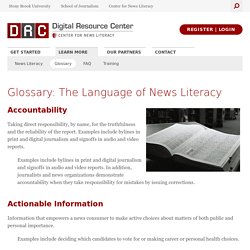
Examples include bylines in print and digital journalism and signoffs in audio and video reports. Examples include bylines in print and digital journalism and signoffs in audio and video reports. In addition, journalists and news organizations demonstrate accountability when they take responsibility for mistakes by issuing corrections. Actionable Information Information that empowers a news consumer to make active choices about matters of both public and personal importance. Examples include deciding which candidates to vote for or making career or personal health choices. Advertising Attracting attention by paying to have announcements placed on billboards, in newspapers and broadcasts or on websites. Balance Equality between the totals of the two (or more) sides of the account. Bias Cognitive Dissonance Confirmation Bias Context Direct Evidence Entertainment Fair Comment.
Serial Retrial Expert Witness: Vacated Conviction for Serial's Adnan Syed. Serial, a multi-episode nonfiction podcast hosted by investigative journalist Sarah Koenig, featured Syed’s case in its inaugural season in 2014.
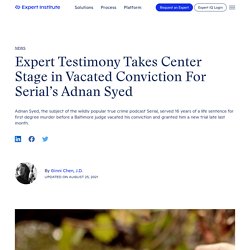
Since then, the episodes discussing Syed’s case have been downloaded over 80 million times. Thus making Serial one of the most listened-to podcasts of all time. Public attention aside, what may be interesting to the legal community is why the court granted Syed a new trial. The reasoning centers on inadequate cross-examination of a key expert witness by Syed’s defense attorney Cristina Gutierrez. At the time of Syed’s trial, Gutierrez was a widely respected criminal defense attorney who had represented numerous high-profile defendants. Third Thought - Waynflete. Third Thought Initiatives for Civic Engagement was established with the financial support of a $250,000 matching grant from the Edward E.
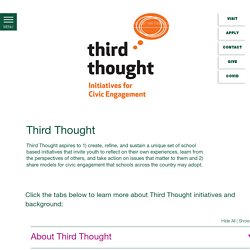
Ford Foundation. Through a variety of youth-centered initiatives, Third Thought channels the energy and capacity of young people and supports their development as agents of change in a nation that suffers from divisions that paralyze our democratic processes. Our work is based on the belief that: diversity of thought and experience is a source of wisdom that should be valued rather than feared.young people have the desire to be civically engaged members of our communities.young people can be trusted to lead conversations that bridge the divides on the most pressing issues of our day.young people have the capacity to work creatively and collaboratively across differences.
Bad News. Factitious. Misinformation. Content. Discussions: What Would It Take to Change Your Mind About Something You Really Believed? News Literacy Quiz: The Easiest Quiz of All Time. The Best (and Worst) Sources of Health News on the Web. There are many ways that journalists get news.

It can be at major medical meetings or through some of the many medical journals that publish original research. If a news story is based on a new study, where the study was published matters. Some journals have intensive peer-review processes, meaning that physicians take a deep dive into the data to make sure that the conclusions are correct and that the methodology is sound, while others may be less scrupulous. Lesson Plans - Media Misinformation, Viral Deception, and "Fake News" - LibGuides at University of Wyoming. Bad News. Introducing This Is Fake, Slate’s tool for stopping fake news on Facebook. One of the more extreme symptoms of media dysfunction in the past several months has been the ascendance of “fake news”—fabricated news stories that purport to be factual.
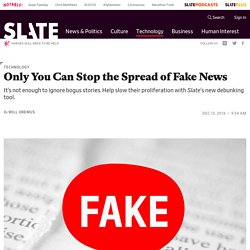
The phenomenon is not altogether novel, but the scale at which it is now being produced and consumed is unprecedented. A BuzzFeed data analysis found that viral stories falsely claiming that the Pope had endorsed Donald Trump, that Hillary Clinton was implicated in the murder of an FBI agent, that Clinton had sold weapons to ISIS, all received more Facebook engagement than the most popular news stories from established outlets such as the New York Times and CNN. Made-up stories with a liberal slant made the rounds as well, although the evidence suggests they propagated less widely.
At a time when trust in the media is at an all-time low and political polarization is intensifying, fake news is hardly the only pox afflicting our democracy. Fact-Checking Sites and Plug-Ins - Fake News: Develop Your Fact-Checking Skills - Research Guides at Benedictine University Library. Breaking News Consumer's Handbook: Fake News Edition. BROOKE GLADSTONE: Drawing a distinction between fake and real news is going to be hard for those Facebook and Google employees tasked with bird dogging offending sites, but it shouldn’t be so hard for you, the consumer.
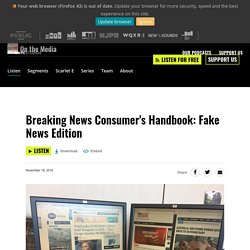
Melissa Zimdars, professor of communication and media at Merrimack College, has made a list of more than a hundred problematic news sites, along with tips for sorting out the truthful from the troublesome. She got into the fake news sorting racket after a hot tip. MELISSA ZIMDARS: Someone alerted me to the fact that when you searched for the popular vote on Google, the first Google news item that came up was a fake news website saying that Hillary Clinton lost the popular vote. BROOKE GLADSTONE: Mm-hmm. MELISSA ZIMDARS: And that's when I was like, yeah, we need to teach our students [LAUGHS] how to navigate this. BROOKE GLADSTONE: Tell me what the reaction’s been to the doc? Bad News. Evaluating Information: The Cornerstone of Civic Online Reasoning.
Study: Students show ‘troubling’ lack of news literacy skills — News Literacy Project. A new report from the Stanford History Education Group has found little change in high school students’ ability to evaluate information online since 2016, when SHEG researchers released the results of a similar study.
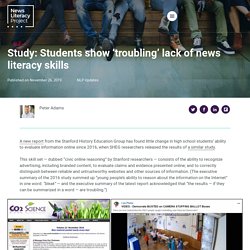
This skill set — dubbed “civic online reasoning” by Stanford researchers — consists of the ability to recognize advertising, including branded content; to evaluate claims and evidence presented online; and to correctly distinguish between reliable and untrustworthy websites and other sources of information. (The executive summary of the 2016 study summed up “young people’s ability to reason about the information on the Internet” in one word: “bleak” — and the executive summary of the latest report acknowledged that “the results — if they can be summarized in a word — are troubling.”) For the latest findings, SHEG partnered with Gibson Consulting, an education research group, to assess 3,446 high school students from 16 school districts in 14 states. Analyzing News Sources - Fake News - Library Home at Notre Dame de Namur University.
Confirmation bias: the tendency to believe information is credible if it conforms to the reader’s/viewer’s existing belief system, or not credible if it does not conform content farm or content mill: a company that employs a staff of freelance writers to create content designed to satisfy search engine retrieval algorithms with the goal of attracting views and advertising revenue echo chamber: a situation in which information, ideas, or beliefs are amplified or reinforced by transmission and repetition inside an “enclosed” system, where different or competing views are censored, disallowed, or otherwise underrepresented fact checking: the act of verifying assertions either prior to publication or after dissemination of the content filter bubble: When search tool results present stories we are likely to click on or share based on our past activity, potentially affirming our biases.
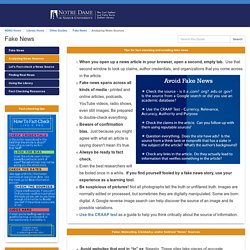
Algo_study. Big Tech’s Pandemic Power Grab - The Atlantic In the years before the virus, critics began to prophesy that a handful of tech companies would soon grow more powerful than the government.
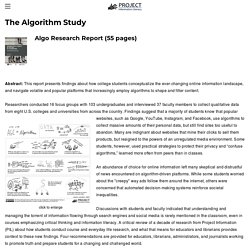
Their scale and influence, and their ability to manipulate public opinion and shape markets, would permit them to reign unimpeded. That warning, however dark, didn’t quite capture the emerging strategy of these firms—a strategy that was in fact taking shape before the pandemic began—or the graver threat they pose. Rather than supplanting government, they have, in essence, sought to merge with it. Misquoted and misunderstood: Why many in the search community don't believe the WSJ about Google search.
Home of the Media Bias Chart - Ad Fontes Media Version 5.0. Special Report: The Changing Face of Literacy. There has never been a generation of young people more immersed in digital media than this one, many of whom learned to use a mobile device before they even started school.
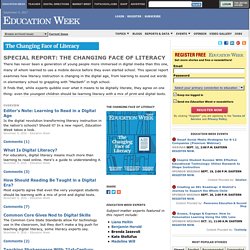
This special report examines how literacy instruction is changing in the digital age, from learning to sound out words in elementary school to grappling with “Macbeth” in high school. It finds that, while experts quibble over what it means to be digitally literate, they agree on one thing: even the youngest children should be learning literacy with a mix of print and digital texts.
Is the digital revolution transforming literacy instruction in the nation’s schools? Fact-checking pundits. FAQ - Hoax-Slayer. The News Literacy Project. An Engaging Word Game Helps Students Grasp Implicit Bias. As part of an effort to demonstrate the effect of implicit bias, library media specialist Jacquelyn Whiting devised an exercise that looks similar to “Mad Libs,” the popular fill-in-the-blank word game.
In EdSurge’s “Everyone Has Invisible Bias. This Lesson Shows Students How to Recognize It,” Whiting describes how she removed words from a New York Times opinion essay to create a new, highly engaging activity for a 10th-grade class. Jacquelyn Whiting Whiting removed key words from the essay to create a paragraph for students to fill-in-the-blank. A student's goal “is to make the paragraph cogent, to choose words that make sense in context,” Whiting writes. Sharply conflicting viewpoints emerged, and it became more obvious to the students that word choice matters.
YourBias.is. Factitious.com. Allsides.com. The Media Savvy Citizen. Civic Lab Go To News Sources. SIFT (The Four Moves) How can students get better at sorting truth from fiction from everything in between?
At applying their attention to the things that matter? At amplifying better treatments of issues, and avoiding clickbait? Since 2017, we’ve been teaching students with something called the Four Moves. Our solution is to give students and others a short list of things to do when looking at a source, and hook each of those things to one or two highly effective web techniques. Fact Finder: Your Foolproof Guide to Media Literacy. Are your students savvy searchers?
Can they spot the difference between a straight news article and an opinion piece? Do they recognize bias in their sources … or in themselves? Tackle these challenges and more using Fact Finder’s 11 flexible, multimedia lesson plans. Eight skill-building lesson plans introduce essential media literacy concepts through engaging explainer videos and colorful infographics that help students revisit, retain and apply the key concepts. How Google Creates Alternative Reality. COVFEFE – Google deleted this word from its Arabic-English dictionary after President Trump used it in his tweet on May 31, 2017. The original translation of this word (more accurately rendered in English as “cov fe’fe”) was “I will stand up“. Trump used it in a tweet “Despite constant negative press covfefe“, when he came back from Saudi Arabia. Few hours later, he tweeted “Who can figure out the true meaning of “covfefe” ??? Enjoy!” Getting Beyond the CRAAP Test: A Conversation with Mike Caulfield.
I have been a fan of Mike Caulfield's work in developing new tools for helping students learn the skills of digital literacy and fact checking for quite some time. I even put an exercise in The Writer's Practice built on Caulfield's "four moves. " When I found out he has a new project that is freely available to instructors and highly adaptable to any course, I wanted to do what I can to get the word out. We talked about both the new project in specific and his bigger project in general. - JW. Check, Please! Starter Course. OMICS, Publisher of Fake Journals, Makes Cosmetic Changes to Evade Detection. New Delhi: A glut of fake scientific journals, which publish dubious research for money, has been posing many challenges for the world’s research community of late. Despite many warnings issued by the publishers of legitimate journals to stay away from their fake/duplicate counterparts, many gullible researchers fall for them as these journals resemble the real things in look and feel.
Learning the Techniques of Media Manipulators. SearchReSearch. Lateral Reading and the Nature of Expertise: Reading Less and Learning More When Evaluating Digital Information. Fact Checker Infographic. The Rise of Junk Science. In early 2017, Eduardo Franco, a professor in the Faculty of Medicine at McGill University, sent an email to his colleagues, warning them of a global “epidemic” of scams by academic journals that was corrupting research and, in effect, endangering the public. As head of the oncology department, where he oversees approximately 230 people, Franco promised to comb through every CV and annual evaluation in the department to flag any colleagues’ resumés that listed journals and conferences that weren’t reputable or, in some cases, even real.
He didn’t spell out the consequences, but the implication was clear: the faculty members would be held accountable. A scholar for forty years, Franco has followed the rise of junk publishers for about a decade. He has seen them go from anomalous blights on academics’ credentials to widespread additions on scholarly resumés, nearly indistinguishable from legitimate work. Now, he says, “there’s never been a worse time to be a scientist.” So they rebelled.
'Why I write fake online reviews' Image copyright Iain Taylor "I've learned never to rely on reviews for anything," says Iain Taylor, from East Sussex. 5-star phonies: Inside the fake Amazon review complex. “Isn’t this illegal?” Some Helpful Google Search Tips for Teachers and Students. How Much of the Internet Is Fake? Dr. Google Is a Liar. The long, tortured quest to make Google unbiased. Next week, Sundar Pichai will try to reassure Congress that Google’s search engine isn’t rigged. School Library Journal. Media Education Documentary Films and Educational Resources. Mind Over Media. Fake Or Real? How To Self-Check The News And Get The Facts. The Problem with Fake News (and how our students can solve it) Empowerment through Education.
Media Literacy Now – Advocating for Media Literacy Education. UM Library Fake News Course. Determining the real from the fake health news - Philly. Website Evaluation - Information Literacy - LibGuides at NYC DOE Office of Library Services. The End of Reality. Bias already exists in search engine results, and it’s only going to get worse. Checkology. The (almost) complete history of 'fake news' Help Students Spot Student Fake News. When news breaks, Google still can’t separate rumor from fact. Google Trust Project: Help Identify Trustworthy News. Pizzagate: Anatomy of a Fake News Scandal - Rolling Stone. We Can’t Trust Facebook to Regulate Itself. It’s time to stop trusting Google search already. Facebook, Google and others join The Trust Project, an effort to increase transparency around online news. How Does Fake News Become News?
The Future of Truth and Misinformation Online. Google, Facebook, and Twitter Need a New Approach to Tackling Chaos. Google asks the dumbest questions. In the ‘Fake News’ Era, Americans Increasingly Value Libraries - CityLab. UW professor: The information war is real, and we’re losing it. 14 Ways K–12 Librarians Can Teach Social Media by Joyce Valenza. Facebook steps up fake news fight with 'Related Articles' - Aug. 3, 2017. Episode 16: "Fighting Fake News" by American Libraries Dewey Decibel Podcast. E.S.C.A.P.E. Junk News - NewseumED. Home - Media Literacy Clearinghouse. The News Literacy Project. Center for Media Literacy. How to Protect Students From Fake News. How to Spot Fake News - FactCheck.org.
Digital and Media Literacy Education. Assignment: Media Literacy. News Outlets to Seek Bargaining Rights Against Google and Facebook - The New York Times. The news industry is worried Facebook and Google have far too much power - The Verge. How media literacy can help students discern fake news. Real things teachers can do to combat fake news. Beers & Probst: Responsible Reading and Fake News. How Media Literacy Can Help Students Discern Fake News - Teaching and Learning - Education Week Video – EdWeek.org. Truth, truthiness, triangulation: A news literacy toolkit for a “post-truth” world.
Top 10 sites to help students check their facts. National Council for the Social Studies. Media Literacy Clearinghouse. Accelerating Change: What is 21st Century Media Literacy? The Fake-News Fad: Let it Fade.